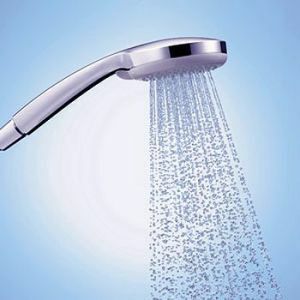
- How often should I clean the shower? What materials does the shower cubicle consist of?
- Than to clean a shower cabin?
- Than you can not clean the shower?
- How to clean the shower - daily care
- How to clean the shower - periodic cleaning
- Additional recommendations
More and more people replace the old baths with new shower cabins. This is one of the most visited premises, it is subjected to the greatest load in the bathroom, and therefore it is simply necessary to know what to wash the shower to ensure that it remains safe and attractive.
to the contents ↑How often should I clean the shower?
Each owner of such a plumbing should have a permanent habit of courting her. This will help increase the life of its many times. To protect your shower from the harmful effects of impurities contained in the water( minerals, iron, salts), follow the simple rules for cleaning plumbing:
- a short washing-rinse without special cleaning agents every time after using the cabin;
- perform more thorough cleaning at least once a week;
- General cleaning of the shower cubicle with the use of disinfectants do 1 time per month or two.
What materials does the shower cubicle consist of?
 In order to properly care for the surface, you will first have to specify which parts and materials it consists of. Today's choice of such plumbing is quite wide - furniture is distinguished by design, a combination of materials, size, color, shape. Most often for the manufacture of a shower cubicle use:
In order to properly care for the surface, you will first have to specify which parts and materials it consists of. Today's choice of such plumbing is quite wide - furniture is distinguished by design, a combination of materials, size, color, shape. Most often for the manufacture of a shower cubicle use:
- Plastic;
- Acrylic;
- Glass;
- Stone;
- Ceramics;
- Enamel for coating the metal surface;
- Painted aluminum;
- Chromed steel.
Important! Before selecting and using the , the shower cleaning products try to find out which chemical elements can adversely affect a particular material.
to the contents ↑Than to clean a shower cabin?
In order to clean mechanically you will need:
- scrapers and brushes;
- sponges;
- wipes for polishes;
- rags from microfiber;
- steam generators.
To quickly remove rust, lime scale, yellowness from the surface with household chemicals, prepare in advance:
- liquid, soft detergents for frequent cleaning;
- pastes and creams to remove complex contaminants;
- sprays for polishing glass and metal surfaces;
- foam for preventive wiping of the surfaces of the shower cubicle.
Important! The above methods alone are not very effective and therefore better combined. For example, detergents for the shower cabin can not be used without a washcloth. To work with creams and pastes, brushes and sponges are suitable for cleaning .And aerosol polishes are useless to use without soft napkins.
to the contents ↑Than it is impossible to clean the shower?
We do not recommend the use of abrasive cleaners, hard brushes and metal sponges for washing showers. They can leave marks and scratches on the surface.
Do not use detergents containing:
- Alkalys;
- Formaldehyde;
- Formic and other acids;
- Organic solvents like gasoline and acetone;
- Cleaners with coloring pigment - acrylic, for example, is extremely sensitive to them.
How to wash the shower - daily care
Daily care is more simple and does not require you to make significant efforts. Wash as follows:
- After taking a shower, first hot and then with cold water rinse the walls with a shower.
- Use a special scraper to remove all water from the surfaces.
- Take a terry towel or microfiber and wipe dry all surfaces.
 Periodic care is carried out 2-4 times a month, depending on the frequency of use of the shower. To properly wash it, choose the method that suits you and follow the instructions clearly.
Periodic care is carried out 2-4 times a month, depending on the frequency of use of the shower. To properly wash it, choose the method that suits you and follow the instructions clearly.
How to clean the shower - the periodic wash
Especially for those who wish to keep the bathroom clean, we recommend the simplest way to clean the surfaces in the bathroom:
- Rinse all soils with a washcloth and warm water to reach hard to remove stains,such as limescale, rust or fungus.
- Choose a detergent designed to clean a particular contamination.
- Apply the cleaning agent to the surface and leave for 15-20 minutes.
- Take the brush and carefully clean the dirt.
- After this procedure, wait for another 10 minutes and wash off all contamination with a washcloth and cool water.
Additional recommendations
In the bathrooms, a wide variety of soils can be formed, such as:
- soap bubbles and salt deposits;
- fungal formations and mold;
- rust and grease.
Here are some useful basic tips for washing the shower enclosure, which will allow cleaning to be performed very efficiently, but with minimal time and effort:
- Cleaning agent applied to unsealed and shallow dirt can be washed off immediately after application.
- With long-term pollution, you will have to be patient and wait a few minutes.
- Do not forget to pay attention to the instruction manual for the used detergent or cleaning agent - do not deviate from the manufacturer's recommended technology. Not always, for example, longer processing guarantees the best result - if you overstrain the chemical solution on the surface, you can simply damage it irretrievably.
- From metal and acrylic surfaces, stains can be removed with toothpaste, if applied for 5-7 minutes, and then washed off.
- Special tools designed for cleaning acrylic leave a special thin layer on its surface, preventing dirt from curing - do not try to remove it specially.
- To prevent contamination, wipe dry all surfaces after showering - calcium and chlorine, which are contained in water, settle a thin layer on the surface. It reduces the gloss of any coating and, over time, becomes difficult to remove contamination.
- After showering, leave the cab door open. This will not allow the formation of mold and fungus in seams treated with sealant.
- To restore the lost luster to chrome surfaces, use a special silver rub during washing. It creates special protection for chromium.
If stains are not helped to get rid of even the strongest detergents, try using a 5-10% solution of citric acid or acetic acid.


